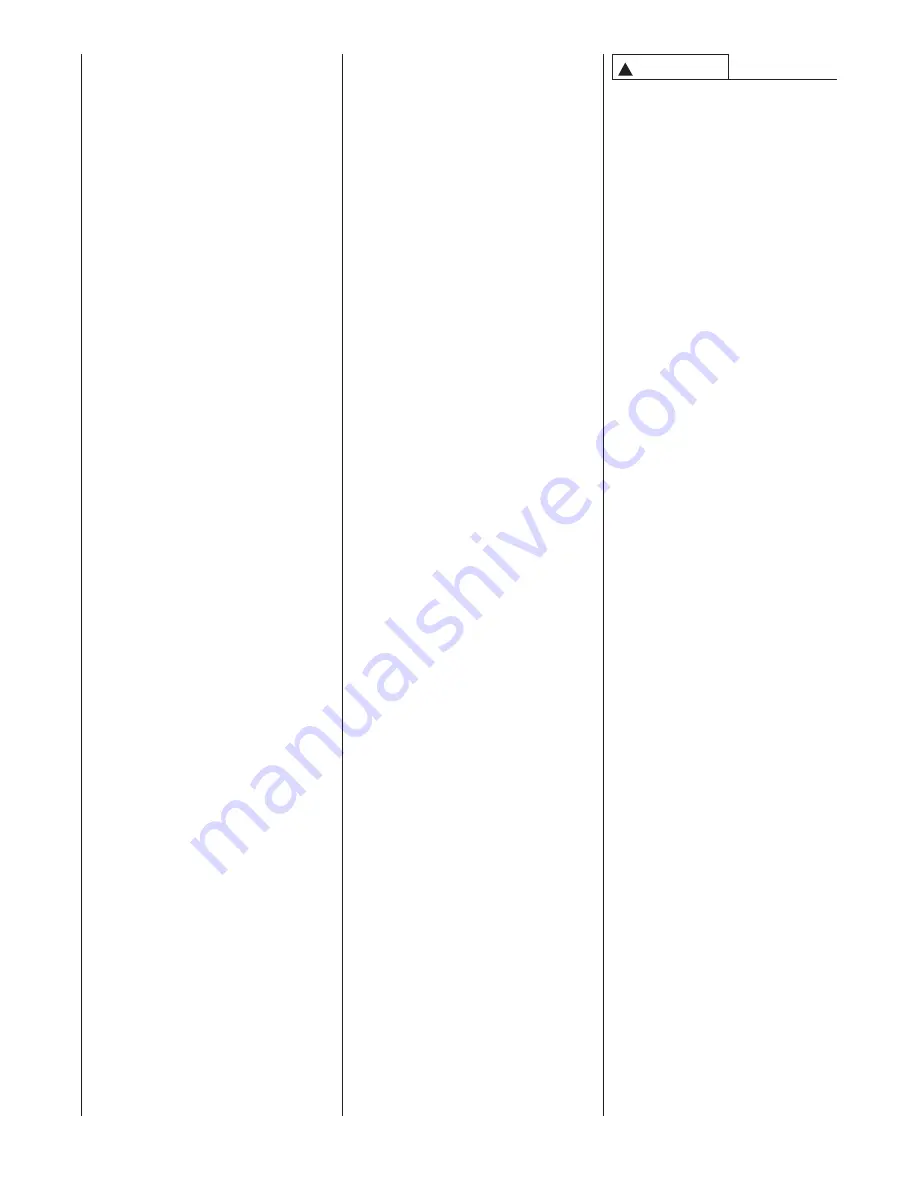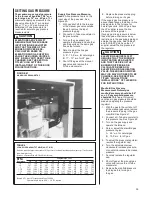
HOLES IN THE VENT PIPE OR
HEAT EXCHANGER CAN CAUSE
TOXIC FUMES TO ENTER THE
HOME, RESULTING IN CARBON
MONOXIDE POISONING OR
DEATH. THE VENT PIPE OR HEAT
EXCHANGER MUST BE
REPLACED IF THEY LEAK.
• IMPORTANT:
It is recommended
that at the beginning of the heating
season, the flame sensor be
cleaned with steel wool by a
qualified installer, service agency or
the gas supplier.
• IMPORTANT:
It is recommended
that at the beginning of the heating
season, the condensate trap be
inspected for debris or blockage. A
blocked condensate trap can cause
water to back up into the primary
heat exchanger and lead to
nuisance tripping of the
overtemperature switches.
• IMPORTANT:
It is recommended
that at the beginning of the heating
season, the condensate neutralizer
if used be replaced by a qualified
installer, service agency or the gas
supplier.
• IMPORTANT:
It is recommended
that an annual inspection and
cleaning of all furnace markings be
made to assure legibility. Attach a
replacement marking, which can be
obtained through the distributor, if
any are found to be illegible or
missing.
REPLACEMENT PARTS
See sheet enclosed with furnace for
replacement part information.
TROUBLESHOOTING
Refer to Figures 56 for determining
cause of unit problems.
WIRING DIAGRAMS
Figures 57 through 60 are complete
wiring diagrams for the furnace and
power sources.
LUBRICATION
IMPORTANT: DO NOT
attempt to
lubricate the bearings on the blower
motor or the induced draft blower
motor. Addition of lubricants can
reduce the motor life and void the
warranty.
The blower motor and induced draft
blower motor are permanently
lubricated by the manufacturer and do
not require further attention.
The blower motor and induced draft
blower motor must be cleaned
periodically by a qualified installer,
service agency, or the gas supplier to
prevent the possibility of overheating
due to an accumulation of dust and
dirt on the windings or on the motor
exterior. And, as suggested
elsewhere in these instructions, the
air filters should be kept clean. Dirty
filters can restrict airflow. The motor
depends upon sufficient air flowing
across and through it to keep from
overheating.
SYSTEM OPERATION
INFORMATION
Advise The Customer
1. Keep the air filters clean. The
heating system will operate
better, more efficiently and more
economically.
2. Arrange the furniture and drapes
so that the supply air registers
and the return air grilles are
unobstructed.
3. Close doors and windows. This
will reduce the heating load on
the system.
4. Avoid excessive use of kitchen
exhaust fans.
5. Do not permit the heat generated
by television, lamps or radios to
influence the thermostat
operation.
6. Except for the mounting platform,
keep all combustible articles 3
feet from the furnace and vent
system.
7.
IMPORTANT:
Replace all blower
doors and compartment covers
after servicing the furnace. Do
not operate the unit without all
panels and doors securely in
place.
8. Explain proper operation of the
system with constant air
circulation.
ANNUAL INSPECTION
• The furnace should operate for
many years without excessive scale
build-up in the flue passageways.
However, it is recommended that a
qualified installer, service agency, or
the gas supplier annually inspect
the flue passageways, the vent
system and the main burners for
continued safe operation. Pay
particular attention to deterioration
from corrosion or other sources.
•
IMPORTANT:
It is recommended
that at the beginning and at
approximately half way through the
heating season, a visual inspection
be made of the main burner flames
for the desired flame appearance by
a qualified installer, service agency
or the gas supplier. If the flames are
distorted and/or there is evidence of
back pressure, check the vent and
inlet air system for blockage. If there
is carbon and scale in the heat
exchanger tubes, the heat
exchanger assembly should be
replaced.
!
WARNING
ENTRAINED IN THE AIR MAY
TEMPORARILY LODGE IN THE AIR
DUCT RUNS AND AT THE SUPPLY
REGISTERS. ANY RECIRCULATED
DUST PARTICLES WILL
BE HEATED AND CHARRED BY
CONTACT WITH THE FURNACE
HEAT EXCHANGER.
THIS RESIDUE WILL SOIL
CEILINGS, WALLS, DRAPES,
CARPETS AND OTHER
HOUSEHOLD ARTICLES.
53




































